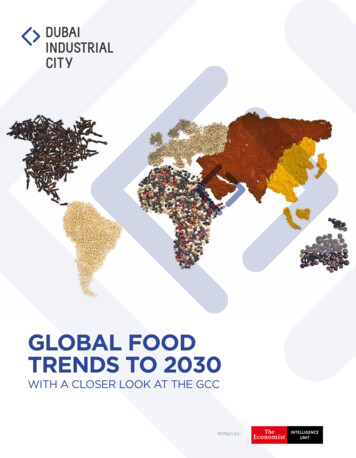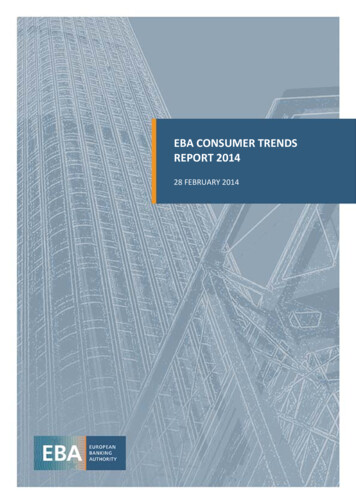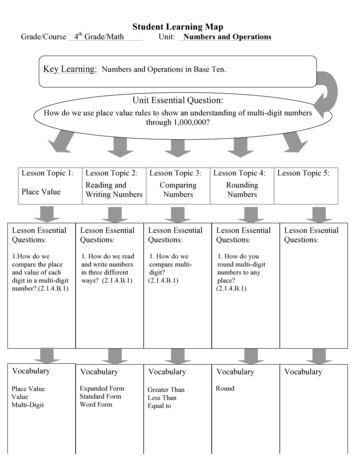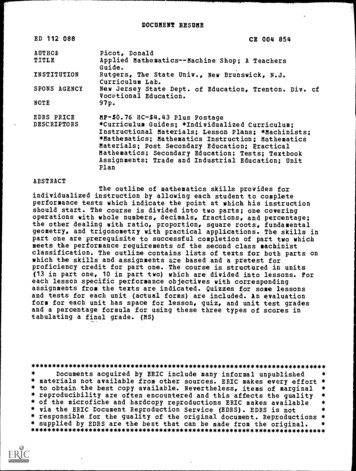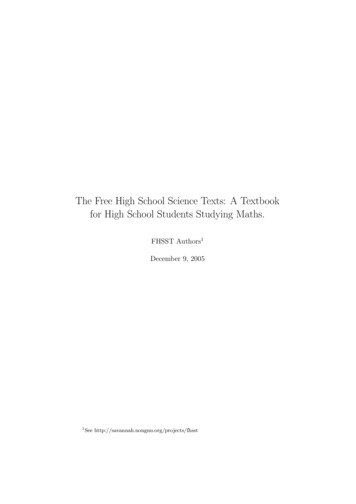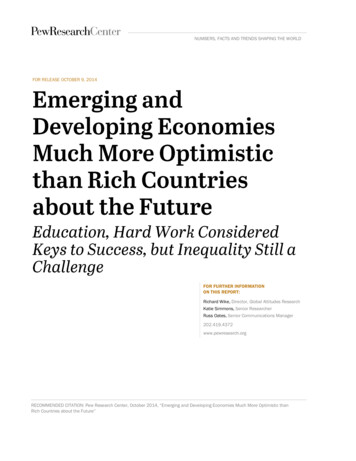
Transcription
NUMBERS, FACTS AND TRENDS SHAPING THE WORLDFOR RELEASE OCTOBER 9, 2014FOR FURTHER INFORMATIONON THIS REPORT:Richard Wike, Director, Global Attitudes ResearchKatie Simmons, Senior ResearcherRuss Oates, Senior Communications Manager202.419.4372www.pewresearch.orgRECOMMENDED CITATION: Pew Research Center, October 2014, “Emerging and Developing Economies Much More Optimistic thanRich Countries about the Future”
1PEW RESEARCH CENTERAbout the ReportThis report examines public opinion about opportunity and inequality around the world, includingfinancial prospects for the next generation, the biggest factors to getting ahead in life and the causes ofinequality. It is based on 48,643 interviews in 44 countries with adults 18 and older, conducted fromMarch 17 to June 5, 2014. For more details, see survey methods and topline results.The report is a collaborative effort based on the input and analysis of the following individuals:Katie Simmons, Senior ResearcherRichard Wike, Director, Global Attitudes ResearchJames Bell, Director, International Survey ResearchDanielle Cuddington, Research AssistantKat Devlin, Research AnalystMichael Keegan, Information Graphics DesignerJacob Poushter, Research AssociateBethany Smith, Administrative CoordinatorJill Carle, Research AssociateClaudia Deane, Director, Research PracticeBruce Drake, Senior EditorBridget Parker, Research AssistantSteve Schwarzer, Research MethodologistBruce Stokes, Director, Global Economic AttitudesAbout Pew Research CenterPew Research Center is a nonpartisan fact tank that informs the public about the issues, attitudes andtrends shaping America and the world. It does not take policy positions. It conducts public opinionpolling, demographic research, media content analysis and other empirical social science research. Thecenter studies U.S. politics and policy views; media and journalism; internet and technology; religion andpublic life; Hispanic trends; global attitudes and U.S. social and demographic trends. All of the center’sreports are available at www.pewresearch.org. Pew Research Center is a subsidiary of The Pew CharitableTrusts.James McMillan, Acting PresidentMichael Dimock, Executive Vice PresidentElizabeth Mueller Gross, Vice PresidentRobyn Tomlin, Chief Digital OfficerAndrew Kohut, Founding Director Pew Research Center 2014www.pewresearch.org
2PEW RESEARCH CENTERAs they continue to struggle with the effects of theGreat Recession, publics in advanced economies arepessimistic about the financial prospects for the nextgeneration. Most of those surveyed in richer nationsthink children in their country will be worse offfinancially than their parents. In contrast, emergingand developing nations are more optimistic that thenext generation will have a higher standard of living.Overall, optimism is linked with recent nationaleconomic performance. Countries that have enjoyedrelatively high levels of growth in recent years alsoregister some of the highest levels of confidence intheir children’s economic futures.Looking ahead, people in the emerging and developingworld see better opportunities at home than abroad.Majorities or pluralities in 30 of the 34 emerging anddeveloping nations surveyed say they would tell youngpeople in their country to stay at home in order to leada good life, instead of moving to another country.Little Optimism for the Next Generationin Advanced EconomiesWhen children in our country today grow up, will theybe financially than their parents?Advanced economies(10 country median) 65%Worse off28%Emerging markets(25 country median)25Developing economies(9 country median)503951Note: Medians by country economic categorization.Source: Spring 2014 Global Attitudes survey. Q11.PEW RESEARCH CENTEREducation Important for Getting AheadOn a scale of 0 to 10, how important is to get aheadin life? Percent saying “10 – very important”Having a good education60%50Working hard37Knowing the right peopleA good education and hard work are most often seenas the keys to getting ahead in life. This view isespecially prevalent in emerging and developingnations, where most see economic opportunityexpanding. Still, many also believe success can bedetermined by things outside a person’s control, suchas luck or having a wealthy family.Better off33Being luckyBelonging to a wealthyfamily2017Being a maleGiving bribes5Note: Global medians across 44 countries surveyed.Source: Spring 2014 Global Attitudes survey. Q66a-g.PEW RESEARCH CENTERwww.pewresearch.org
3PEW RESEARCH CENTERDespite the long-term optimism that exists in manycountries, there are widespread concerns aboutinequality. Majorities in all of the 44 nations polledsay the gap between rich and poor is a big problemfacing their countries, and majorities in 28 nationsidentify this as a very big problem. More than sevenin-ten hold this view in Greece, Spain and Italy –countries that faced significant economic challengesduring the last several years. But even in the emergingand developing nations that have enjoyed tremendousgrowth over the last couple of decades, there is aconsensus that those at the top are reaping the gainswhile others are being left behind.1People blame inequality on a variety of causes, butthey see their government’s economic policies as thetop culprit. A global median of 29% say those policiesare most to blame for the gap between rich and poor.Fewer people blame the amount of workers’ wages, theeducational system, the fact that some work harderthan others, trade, or the tax system.The survey also asked what would do more to reduceinequality: low taxes on the wealthy and corporationsto encourage investment and growth, or high taxes onthe wealthy and corporations to fund programs thathelp the poor. The balance of opinion in emerging anddeveloping nations is that low taxes are most effectivewhile people in advanced economies tend to favor hightaxes.Inequality Seen as Major ChallengeThe gap between the rich and poor is a very big problemAdvancedGreeceSpainItalyFranceIsraelSouth aPakistanTurkeyChileColombiaNigeriaArgentinaSouth andaEl SalvadorSenegalNicaraguaPalest. 058577776747360Source: Spring 2014 Global Attitudes survey. Q23c.PEW RESEARCH CENTER1Advanced economies include France, Germany, Greece, Israel, Italy, Japan, South Korea, Spain, UK & the U.S. Emerging economies includeArgentina, Brazil, Chile, China, Colombia, Egypt, India, Indonesia, Jordan, Lebanon, Malaysia, Mexico, Nigeria, Pakistan, Peru, Philippines,Poland, Russia, South Africa, Thailand, Tunisia, Turkey, Ukraine, Venezuela & Vietnam. Developing economies include Bangladesh, El Salvador,Ghana, Kenya, Nicaragua, Palestinian territories, Senegal, Tanzania & Uganda.www.pewresearch.org
4PEW RESEARCH CENTERWhile inequality is considered a major challenge by a median of 60% across the 44 nations polled, highernumbers say rising prices and a lack of job opportunities (medians of 77%) are very big problems. Andpeople in advanced, emerging and developing markets alike are clearly willing to live with some degree ofinequality as part of a free market system. Majorities or pluralities in 38 of 44 countries say that mostpeople are better off in a free market economy, even though some people are rich while others are poor.These are among the key findings of a survey by thePew Research Center, conducted in 44 countriesamong 48,643 respondents from March 17 to June 5,2014. While this report focuses largely on differencesand similarities between economically advanced,emerging and developing nations, the survey alsofinds significant differences by region.For instance, Asians are particularly optimistic aboutthe next generation’s financial prospects. Fully 94% ofVietnamese, 85% of Chinese, 71% of Bangladeshis, and67% of Indians think today’s children will be better offthan their parents. Africans and Latin Americans arealso on balance optimistic, while Middle Easternerstend to be pessimistic. And in Europe and the UnitedStates, pessimism is pervasive.Asia Optimistic about Children’s FutureWhen children in our country today grow up, will theybe financially than their parents?Worse offAsia24%AfricaLatin AmericaMiddle EastBetter off58%27513741U.S. 65Europe 6550353025Note: Median percentages by region. Russia and Ukraine notincluded in Europe median.Source: Spring 2014 Global Attitudes survey. Q11.PEW RESEARCH CENTERwww.pewresearch.org
5PEW RESEARCH CENTERThe survey also highlights how Americans are different from many others around the world on questionsrelated to individualism, a value often associated with American exceptionalism. Fifty-seven percent ofAmericans disagree with the statement “Success in life is pretty much determined by forces outside ourcontrol,” a considerably higher percentage than the global median of 38%. Similarly, Americans place anespecially strong emphasis on the value of hard work – 73% think it is very important to work hard inorder to get ahead in life, compared with a global median of 50%.www.pewresearch.org
6PEW RESEARCH CENTERPeople in emerging and developing nations are moreoptimistic for the next generation than publics inadvanced economies. Still, there is a wide range ofattitudes within each group.About half or more in 16 of the 25 emerging marketssurveyed say children in their nation will be better offfinancially than their parents, including at least sevenin-ten in Vietnam, China, Chile and Brazil. People inMiddle Eastern emerging economies, however, aremuch more skeptical. In Jordan, Turkey, Egypt andLebanon, roughly a third or fewer say the nation’schildren will be better off financially than theirparents. Poles are also considerably pessimistic aboutthe next generation’s opportunities, an outlook whichmay be influenced by the economic crisis in theEuropean Union.Developing economies are divided on this question.Roughly half or more in Bangladesh, Nicaragua,Senegal, Ghana and Uganda say their children will bemore successful than the older generation. Fewer thanfour-in-ten agree in Tanzania, Kenya, El Salvador andthe Palestinian territories.Publics in advanced economies are the mostpessimistic. In most of the high income countriessurveyed, three-in-ten or fewer say the nation’schildren will surpass their parents financially.Majorities in eight of the 10 countries believe theyounger generation will be worse off. The French,Japanese and British are particularly downbeat aboutthe future. Nearly two-thirds of Americans say thesame.In general, countries that have experienced highereconomic growth since 2008 are more optimistic forBetter Future for Next Generation?When children today grow up, will they befinancially than their parents?AdvancedSouth IndonesiaPeruMalaysiaPhilippinesUkraineSouth TanzaniaKenyaEl SalvadorPalest. ter.MEDIANWorse offBetter 3535292826501925262736363228Note: Volunteered category “same” not shown.Source: Spring 2014 Global Attitudes survey. Q11.PEW RESEARCH CENTERwww.pewresearch.org716463635151
7PEW RESEARCH CENTERthe next generation than publics that have had less growth. For example, in China, which has experiencedan average GDP growth of 9% between 2008 and 2013, 85% of the public says young people will be betteroff financially than their parents. Meanwhile, Italians, who have seen their economy contract by anaverage of 2% per year over the course of the global recession, are much less optimistic (15%).GDP Growth and Optimism about Children’s FuturePercent who say today's children will bebetter off financially than their parents100 iaPhilippinesS. KoreaS. AfricaUkraineUgandaColombiaVenezuelaMexico Tunisia PakistanRussiaArgentinaThailand tion 0.640-50510Average % GDP growth (2008-2013)Source: Spring 2014 Global Attitudes survey. Q11. GDP annual growth from IMF World Economic Outlook Database, April 2014, accessedSeptember 4, 2014. Data not available for Palestinian territories.PEW RESEARCH CENTERIn some countries, optimism for the next generation has changed significantly in just the past year andthese shifts in attitudes appear to be related in part to changing views about the country’s economy.Today, 51% of Ugandans say children will be better off financially than their parents, compared with 39%last year. Over the same time period, Ugandans also became significantly more positive about the currenteconomy ( 18 percentage points). Optimism for young people improved since 2013 as well in Senegal( 12), South Africa ( 11), Germany ( 10), Pakistan ( 8), Egypt ( 7) and the UK ( 6). At the oppositeend, hope for the nation’s youth in Venezuela declined by 18 points in the past year as positive ratings ofthe economy also fell by 15 points. Optimism about the children’s future also decreased over the past 12months in Kenya (-19), Malaysia (-14), the Philippines (-11), El Salvador (-8) and Brazil (-7).www.pewresearch.org
8PEW RESEARCH CENTERPerhaps because most publics see a bright future fortheir nation’s youth, people in emerging anddeveloping nations generally believe that it is betterfor young people who want to have a good life to stayin their home country, rather than move to anothercountry.Majorities or pluralities in 30 of the 34 emerging anddeveloping nations surveyed say young people shouldstay at home to be successful, including more thaneight-in-ten in Thailand, Indonesia, Vietnam,Malaysia and Tanzania.In just seven countries do at least four-in-ten say thenext generation has more opportunities abroad. Thisincludes publics that have recently witnessed massivepolitical and economic upheaval, such as theEgyptians, worsening ethnic conflict, such as theLebanese, and severe gang violence, such as theSalvadorans. Poles are also more inclined than mostpublics to say that young people should move abroadto have a good life. This may reflect the open bordersbetween Poland and other EU countries as well asdissatisfaction with economic conditions at home.Most See More Opportunities at HomeWhat would you recommend to a young person whowants a good ArgentinaBrazilChinaTunisiaColombiaSouth ndaGhanaSenegalPalest. ter.El SalvadorMEDIANMove 365In some countries, young people, those ages 18-29, aremore optimistic than people 50 and older aboutprospects for the next generation. The age gap isparticularly large in Uganda ( 22 percentage pointschildren will be better off financially), the UK ( 21),Note: Not asked in advanced economies.Nicaragua ( 20), Spain ( 19) and Thailand ( 15). AtSource: Spring 2014 Global Attitudes survey. Q12.the same time, in many countries, young people arePEW RESEARCH CENTERalso more likely to say there are more opportunities tohave a good life abroad than at home. On thisquestion, the biggest age gaps are in Tunisia ( 25 percentage points recommend young people move toanother country), Brazil ( 19), the Palestinian territories ( 16) and Chile ( 15).www.pewresearch.org
9PEW RESEARCH CENTERMajorities or pluralities in 28 of the 44 countriessurveyed agree that success in life is pretty muchdetermined by forces outside our control. People indeveloping and emerging markets (medians of 56%)are somewhat more likely to believe their fate is out oftheir hands than those in advanced economies (51%).In most developing economies, majorities say successis determined by outside forces, including 74% inBangladesh and 67% in Ghana. Nicaraguans are theleast likely to agree among developing countries.Majorities in 15 of the 25 emerging markets surveyedalso think their fate is out of their hands, includingsix-in-ten or more in Turkey, Vietnam, South Africa,Malaysia, Poland, Lebanon and Nigeria. LatinAmerican countries are generally the least likelyamong emerging markets to agree their future isdetermined by outside forces, including fewer thanfour-in-ten in Colombia, Mexico and Venezuela.Meanwhile, in advanced economies, roughly half orfewer in six of the 10 countries surveyed agree thatsuccess is out of our control. Americans are the leastlikely to say they are not the masters of their fate(40%), one of the lowest percentages among the 44countries surveyed.Most Say Success Determined byOutside ForcesSuccess in life is determined by forces outside our controlAdvancedSouth .MEDIANEmergingTurkeyVietnamSouth iaEl SalvadorSenegalPalest. rce: Spring 2014 Global Attitudes survey. Q13b.PEW RESEARCH 545256
10PEW RESEARCH CENTERWhen asked to rate on a scale of 0 to 10 how important a range of characteristics are to getting ahead inlife, most global publics say having a good education (global median of 60% rating this “10 – veryimportant”) and working hard (50%) are very important. Knowing the right people (37%), being lucky(33%), coming from a wealthy family (20%), being born a male (17%) and giving bribes (5%) are seen asless essential to doing well.In eight of the nine developing countries surveyed, having a good education tops the list of keys tosuccess. About seven-in-ten or more in Nicaragua (78% rate as 10), El Salvador (72%), Senegal (72%) andGhana (69%) say education is very important to advancing in life. Only in Uganda is luck seen as roughlyequal to education in determining one’s future (67% luck vs. 64% education).Similarly, the dominant opinion among emerging markets is that having a good education is veryimportant to being successful, a view held by more than eight-in-ten Venezuelans (86% rate as 10),Colombians (85%), Chileans (85%) and Argentines (84%). Working hard is the second most commonresponse in most countries. Poland, Jordan and Egypt are exceptions among the emerging markets –these publics say luck is at least as important, if not more so, as education or hard work for getting aheadin life.Advanced economies are a bit more divided between education and hard work as the keys to success.Education is the top response among five of the 10 countries – Spain (71% rate as 10), Germany (61%),Israel (41%), Italy (39%) and Greece (31%) – and work ethic is the top in four – the U.S. (73%), UK(60%), Japan (42%) and France (25%). The percentage of Americans who say hard work is veryimportant to getting ahead in life is among the highest across all 44 countries. South Koreans are the onlypublic where knowing the right people is the most commonly cited key to success (rated at the top of thescale by 39%).Even though few rank knowing the right people, being lucky, being from a wealthy family, or being maleas a 10 on the 0-10 importance scale, many people do rate these items highly with a score of seven ormore. For example, while a global median of just 33% rank being lucky at 10, 75% rate it at seven orhigher. In general, emerging and developing publics are somewhat more likely than advanced economiesto believe that all of these items are important for getting ahead.Being a male does not top the list of keys to success, but there is a large gender gap on the question. In 32of the 44 countries surveyed, men are significantly more likely than women to say gender is veryimportant to getting ahead. The gender gap on this issue tends to be larger in the emerging anddeveloping economies surveyed.www.pewresearch.org
11PEW RESEARCH CENTEREducation and Hard Work Important for Getting AheadDeveloping economiesEmerging economiesAdvanced economiesOn a scale of 0 to 10, how important is to getting ahead in life? Percent saying “10 – very important”Having a good WorkingKnowing theBeingBelonging to a Being aeducationhardright peopleluckywealthy aelItalyGreeceSouth kistanSouth uaEl SalvadorSenegalGhanaUgandaPalest. 38413247126725627533565445103334GLOBAL MEDIAN6050373320175Note: Bold indicates the characteristic with the highest percentage for each country.Source: Spring 2014 Global Attitudes survey. Q66a-g.PEW RESEARCH CENTERwww.pewresearch.org
12PEW RESEARCH CENTERA global median of 60% say that the gap between richand poor is a very big problem in their country.Concern is somewhat higher among developingeconomies and emerging markets (median of 60% ineach), but is also shared by people in advancedeconomies (56%).Inequality a Problem, But Not BiggestMedian very big problemRich-poorgap%Publicdebt%Lack ofRisingemployment 60608684Nonetheless, despite this high level of worry aboutinequality, the issue only ties or tops the list ofNote: Medians by country economic categorization.economic problems in four of the 44 countriesSource: Spring 2014 Global Attitudes survey. Q23a-d.PEW RESEARCH CENTERsurveyed. In general, people in advanced economiestend to worry more about public debt andunemployment than inequality, while those inemerging markets and developing economies are more concerned about inflation and jobs. (For more onviews about economic issues, see this September Pew Research report)The top culprit for income inequality cited by publics around the world is their national government’seconomic policies. A global median of 29% say their government’s policies are to blame for the gapbetween the rich and the poor, while the amount workers are paid is a close second at 23%. Globally,people place less blame on the educational system (11%), a lack of individual hard work (10%), tradebetween countries (8%) and the structure of the tax system (8%).Advanced economies in particular lean toward the notion that their governments are to blame forinequality (median of 32%). The Greeks (54%), Spanish (52%) and South Koreans (46%) aregovernment’s harshest critics. Significant percentages among advanced economies also fault workers’wages for the gap between the rich and the poor, including 29% in Japan and 26% each in France andGermany. The Americans and British are two of the few publics to blame individuals’ lack of hard work(24%) about as much as they do their government’s policies (24% in U.S., 23% in UK).www.pewresearch.org
13PEW RESEARCH CENTERGovernment and Workers’ Pay Mostly to Blame for InequalityDeveloping economiesEmerging economiesAdvanced economiesWhich is the most important reason for the gap between the rich and poor in our country today?Our gov’t’sOurSome workTradeeconomicWorkers’ educational harder than betweenOur taxpoliciespaysystemotherscountries systemGreeceSpainSouth ileColombiaBrazilMexicoSouth KenyaPalest. ter.BangladeshGhanaTanzaniaSenegalEl SalvadorUgandaNicaraguaMEDIANGLOBAL 1110Note: Bold numbers indicate a statistically significant majority or plurality.Source: Spring 2014 Global Attitudes survey. Q77.PEW RESEARCH 587268No gap (VOL)/Don’t 51027101573677
14PEW RESEARCH CENTERPluralities or majorities in 22 of the 44countries surveyed say to reduce inequality it ismore effective to have low taxes on the wealthyand corporations to encourage investment andeconomic growth rather than high taxes on thewealthy and corporations to fund programs thathelp the poor. Publics in 13 countries prefer thehigh tax option.Advanced economiesWhat would do more to reduce the gap between the richand the poor in our country?LowHighNeither/Don’ttaxes taxes Both (VOL) knowEmerging economiesPeople in developing economies are also splitbetween blaming the government for incomeinequality in their country and faulting workers’wages. Pluralities in Kenya (36%), Ghana (29%)and Tanzania (29%) say inequality is theirgovernment’s fault, while Salvadorans (32%)tend to blame the amount workers are paid.Nearly equal percentages in the Palestinianterritories, Bangladesh, Senegal and Ugandasay both the government and wages are theculprits. Nicaragua (31%) is the country withthe highest percentage who say a lack ofindividual hard work is the problem.Policies to Reduce Income InequalityDeveloping economiesEmerging markets are more divided. Pluralitiesin nine of the 25 countries surveyed blame theirgovernment for inequality in their country,including roughly four-in-ten or more inUkraine (45%), India (45%), Lebanon (43%),China (43%), Tunisia (43%), Turkey (42%) andNigeria (39%). Meanwhile, pluralities inanother six countries say workers’ wages are theprimary scapegoat. Latin American publics –such as Brazilians (44%), Chileans (39%) andColombians (39%) – are particularly likely toblame inadequate take-home pay for the gapbetween the rich and poor.ItalyFranceGreeceJapanSouth gyptIndonesiaChinaPakistanJordanChileRussiaSouth . ter.BangladeshTanzaniaEl SalvadorSenegalMEDIANGLOBAL 318171851216314101715171141210418711319107Note: Bold numbers indicate a statistically significant majority orplurality. The full question wording is: What would do more to reducethe gap between the rich and the poor in our country? High taxes onthe wealthy and corporations to fund programs that help the poor ORLow taxes on the wealthy and corporations to encourage investmentand economic growth?Source: Spring 2014 Global Attitudes survey. Q77b.PEW RESEARCH CENTERwww.pewresearch.org
15PEW RESEARCH CENTEROverall, advanced economies (median of 48%) are somewhat more supportive than either developing(40%) or emerging (31%) countries of using high taxes on the wealthy and corporations to addressincome inequality. The broadest support comes from Germany, where 61% favor using high taxes to fundpoverty programs. Roughly half or more in Spain (54%), South Korea (53%), the UK (50%) and the U.S.(49%) agree. In Italy (68%), France (61%) and Greece (50%), opinion leans toward low taxes toencourage investment.In most advanced economies, people who say they are very concerned about inequality are particularlysupportive of income redistribution to reduce the gap between the rich and poor. There is also a largeideological divide over taxes in Europe and the U.S. In general, individuals on the left are much morelikely than those on the right to prefer high taxes on the wealthy and corporations. For example, 71% ofthose on the left in Spain support redistribution, compared with 45% of people on the right. In the U.S.,70% of liberals say high taxes are more effective to combat inequality while just 33% of conservativesagree.The prevailing view in most emerging markets surveyed is that low taxes on the rich and businesses tostimulate growth are a better way to address inequality. Roughly six-in-ten or more express this opinionin Brazil (77%), Argentina (60%), Vietnam (60%) and the Philippines
67% of Indians think today's children will be better off than their parents. Africans and Latin Americans are also on balance optimistic, while Middle Easterners tend to be pessimistic. And in Europe and the United States, pessimism is pervasive. Asia Optimistic about Children's Future When children in our country today grow up, will they

